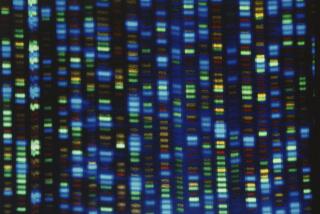Now Where Do We Go?
- Share via
Laurie Garrett assesses the importance of the Human Genetic Project by taking the opinions of scientists who get funding from the project and representatives of companies that intend to market products derived from the research (“Do We Really Want to Know All This” March 3).
The article implies that one can “decipher” a gene simply by determining the sequence of nucleotides that compose the gene. In fact, determining the sequence is relatively easy; understanding the function of the protein specified by the gene is much harder. Knowing a protein’s function does not in itself mean that one can use genetic intervention to cure a disease in an adult. Epilepsy provides one of many examples of why the role of genetics in medicine is necessarily limited.
Ari Berkowitz, Research Fellow
Division of Biology, Caltech
Pasadena
Garrett responds: The Correspondent seems to have missed that, in the article’s conclusions, I raised and concurred with all his points. Behind both the legitimate enthusiasm and the hype of human genome research lie four basic obstacles: (1) translating raw genetic data into useful protein information, (2) development of viable means of gene therapy, (3) discriminating between the relative contributions of genetics and environment and (4) protecting the sanctity and privacy of individual DNA information, even in the absence of solutions to the other three hurdles.
*
When we go shopping, we want the biggest and most unblemished apple, the TV set with the sharpest picture and the safest, most reliable and most attractive car. So why not, when we go “shopping” for a baby, don’t we get one that is relatively disease-free and has the features we want--which will be possible in the near future as result of genetic selection? It sure would beat the unpredictable risk-taking and sometimes agonizing present-day nature of childbirth.
Kenneth L. Zimmerman
Huntington Beach
*






